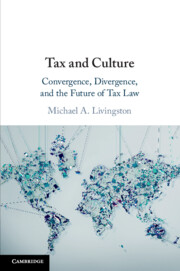Book contents
- Tax and Culture
- Tax and Culture
- Copyright page
- Contents
- Acknowledgments
- 1 Introduction: Comparative Law and Its Relevance to the Tax Field
- 2 Tax Anthropology: Attitudes, Behaviors, and the Role of Historical Contingencies
- 3 Tax Sociology: The Significance of Tax Institutions
- 4 Convergence, Divergence, and the Persistence of National Differences
- 5 Case Studies I: The Tax Cultures of Selected Western and Non-Western Countries
- 6 Case Studies II: Progressivity, Tax Avoidance, and Environmental Taxes
- 7 Conclusion: The Limits of Globalization and the Continuing Importance of Culture
- Index
1 - Introduction: Comparative Law and Its Relevance to the Tax Field
Published online by Cambridge University Press: 13 March 2020
- Tax and Culture
- Tax and Culture
- Copyright page
- Contents
- Acknowledgments
- 1 Introduction: Comparative Law and Its Relevance to the Tax Field
- 2 Tax Anthropology: Attitudes, Behaviors, and the Role of Historical Contingencies
- 3 Tax Sociology: The Significance of Tax Institutions
- 4 Convergence, Divergence, and the Persistence of National Differences
- 5 Case Studies I: The Tax Cultures of Selected Western and Non-Western Countries
- 6 Case Studies II: Progressivity, Tax Avoidance, and Environmental Taxes
- 7 Conclusion: The Limits of Globalization and the Continuing Importance of Culture
- Index
Summary
That law both affects and is affected by the surrounding culture is a proposition so obvious as to hardly need mentioning. Yet the precise direction and nature of this relationship is among the most vexing problems in comparative (or any) law. Is law a reflection of the surrounding culture or one of its principal constitutive elements? Do countries have a legal culture, or subculture, that is distinct from their more general cultural tendencies or is this a contradiction in terms? What does culture consist of in the first place: is it primarily a question of attitudes, institutions, or some combination of the two, and which of these is likely to be more important in a legal context? Are countries becoming more similar in their legal and nonlegal cultures – the so-called globalization phenomenon – or is this merely a comforting myth? Is the term “culture” itself of any real value, or is it so prone to generalization and misstatement as to do more harm than good?
- Type
- Chapter
- Information
- Tax and CultureConvergence, Divergence, and the Future of Tax Law, pp. 1 - 14Publisher: Cambridge University PressPrint publication year: 2020

